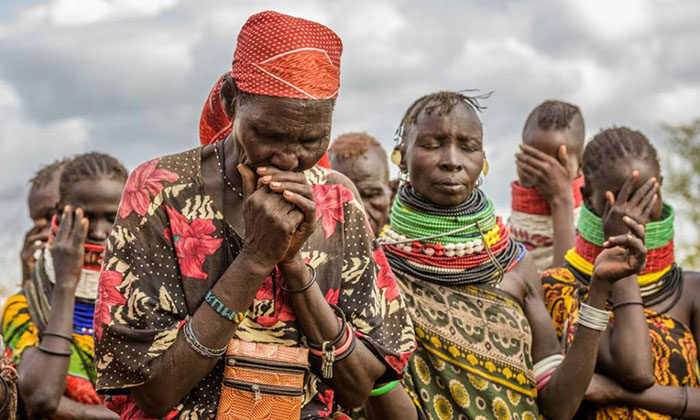
COURTESY PHOTO (facebook.com/WorldVisionInternational)
Sixty percent of the human body is comprised of water.
Amazing! In other words, we need water to survive. Water is not an option for us. Our lives depend on it. Think about how easily a human dehydrates. All it takes is a hard workout, a hot day, or hours of neglecting to drink water. Soon enough, thirst consumes us. So we fill up a large glass and drink until we are satisfied.
The only catch is, not long after quenching our thirst, we are thirsty. Yet again. Water can only satisfy us for a time. Water has limits, but our need for it is infinite.
Spiritually speaking, God has imparted in human beings a knowledge of Himself (Romans 1:20-21) and a need – a thirst – for salvation. The great news is that he has not left us without a solution to our need, nor a quenching for our thirst. This is the eternal lesson Jesus imparts to us in John 4:1-42, as He connects our physical need for water to our spiritual thirst.
“Give me a drink.”
Samaritans were considered a perpetually unclean people. So we learn something mind-blowing from Jesus’ encounter with the Samaritan woman. We learn that He, the Lord of the universe, approaches her and enters her world, without discrimination towards her culture – or her sin. Stunningly, Christ says to the woman, “Give me a drink.”
I imagine this woman frozen in a state of shock, unable to process His request. I imagine her glancing around the well for other people – surely He must be talking to someone else! She replies, “How is it that you, a Jew, ask for a drink from me, a woman of Samaria?”
The King of Kings and Lord of Lords enters her world, addresses her and waits for her reply. Though her sins are glaring, Christ meets her in the midst of them. In the same way, Jesus meets you right where you are – sin and all – and longs to satisfy you with Himself. He does not insist that you clean up and get your act together before he approaches you with his grace. “God shows his love for us in that while we were still sinners, Christ died for us” (Romans 5:8).
“Where do you get that living water?”
Jesus stirs the woman’s interest with His answer to her question: “If you knew the gift of God, and who it is that is saying to you, ‘Give me a drink,’ you would have asked Him, and He would have given you living water” (v. 10). Christ sees her sin and weakness and offers her a gift in himself: salvation from her sin, and the promise of the Holy Spirit, who alone can fully satisfy her deepest longings for freedom from darkness and peace with God.
The woman’s intrigue causes her to ask, “Where do you get that living water?” (v. 11). She thinks Jesus means to track down water beyond their current location. The woman’s understanding is lacking, but this is no surprise to Jesus, who knows everything about her. So what does Jesus do to clarify? He reveals himself:
Jesus said to her, “Everyone who drinks of this water will be thirsty again, but whoever drinks of the water that I will give him will never be thirsty again. The water that I will give him will become in him a spring of water welling up to eternal life (vv. 13-15).
Jesus, in essence, says, “I am Lord and Savior. Follow me, and you will never thirst again! All of your deepest longings will be met in me. I, alone, give salvation from sin and the gift of eternal life. I alone am your Eternal Hope, when you have nothing else in which to hope. I alone am your Eternal Life, when all else is temporary and earthly. Come, you who are thirsty, and drink! With joy, draw water from the wells of salvation (Isaiah 12:3).”
This is Jesus Christ, the way, the truth and the life. He was not spared from death but poured out his righteous blood to cover your sins. He did this to offer you hope – life eternal with him. He did this to satisfy your soul forever by giving you himself.
“Sir, give me this water…”
So what does the woman choose? She answers, “Sir, give me this water so that I won’t get thirsty and have to keep coming here to draw water” (v. 15). She still lacks understanding and is blinded to the Savior. But Christ does not grow impatient with her. Instead, he challenges her ability to save herself from her sin:
Jesus said to her, “Go, call your husband, and come here.” The woman answered him, “I have no husband.” Jesus said to her, “You are right in saying, ‘I have no husband’; for you have had five husbands, and the one you now have is not your husband. What you have said is true” (vv. 16-18).
Jesus, in His grace, reveals her life of sin so that she will see her desperate need for a Savior. Clearly, it will not be by good works that the Samaritan woman is saved or satisfied – she has quite the marriage history, and it does not work in her favor! What hope, then, is there for her? The Living Water, himself. Jesus provides by faith the living water from the wells of salvation for those who believe (Romans 5:2).
We, like the Samaritan woman, cannot work our way into eternal life with God. Our righteous works are like dirty rags compared to the glory of Christ. By faith, we cry out, “Lord Jesus, I am thirsty! Save me and satisfy me, for I cannot save myself.” Will you pray this prayer today? Will you, by faith, believe that only Christ can save and satisfy you forever?
“Savior of the world”
How does the story end? We are told by John that, “Many Samaritans from that town believed in [Jesus] because of the woman’s testimony” (v. 39). We hear the people of Samaria proclaiming Jesus the “Savior of the world” (v. 42), which allows us to assume that the woman believed in Jesus Christ by faith that day. She came thirsty to the well, despite her sin and darkness, and drank from the Living Water.
He alone can satisfy and save our thirsty souls. So all who are thirsty, come and drink!
Originally published at unlockingthebible.org

